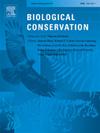Noticing nearby wildlife at home is associated with enhanced mental health and pro-conservation attitudes
IF 4.4
1区 环境科学与生态学
Q1 BIODIVERSITY CONSERVATION
引用次数: 0
Abstract
The growing disconnect between people and nature—the extinction of experience—is concerning, because direct interactions with nature influence both human well-being and public support for biodiversity conservation. Efforts to enhance these interactions are therefore crucial for fostering a sustainable relationship between humans and nature, but little is known about how to effectively achieve this. A key factor shaping how people engage with nature is their noticing of wildlife. Here, we used an online survey to explore the relationships between urban Japanese residents' noticing of nearby wildlife (specifically birds and butterflies) and their mental health and pro-conservation attitudes. We found that individuals who were more likely to notice birdsong and sight birds at their homes tended to have less depression. In addition, those who noticed butterflies reported stronger pro-conservation attitudes. Noticing of nearby birds was greater among individuals living on properties that had more native tree species, and noticing of both birds and butterflies was greater in those in areas with greater surrounding greenspace coverage. These findings suggest that promoting urban residents' noticing of wildlife through strategies such as wildlife gardening and urban greening is crucial for mitigating the negative consequences of the ongoing loss of human–nature interactions. Given that most people's nature experiences occur primarily in residential areas, fostering experiences of wildlife within these spaces could be a key step in reconnecting people with nature.
注意到家里附近的野生动物与增强的心理健康和支持保护的态度有关
人与自然之间日益脱节——经验的消失——令人担忧,因为与自然的直接互动既影响了人类的福祉,也影响了公众对生物多样性保护的支持。因此,加强这些相互作用的努力对于促进人与自然之间的可持续关系至关重要,但人们对如何有效实现这一目标知之甚少。决定人们如何与自然接触的一个关键因素是他们对野生动物的关注。在这里,我们使用一项在线调查来探索日本城市居民对附近野生动物(特别是鸟类和蝴蝶)的注意与他们的心理健康和支持保护态度之间的关系。我们发现,在家里更容易注意到鸟鸣和看到鸟的人往往不那么抑郁。此外,那些注意到蝴蝶的人报告了更强烈的保护态度。居住在拥有更多本地树种的土地上的个体更容易注意到附近的鸟类,而居住在周围绿地覆盖面积较大的地区的个体更容易注意到鸟类和蝴蝶。这些发现表明,通过野生动物园艺和城市绿化等策略来促进城市居民对野生动物的关注,对于减轻人类与自然互动持续减少的负面影响至关重要。考虑到大多数人的自然体验主要发生在住宅区,在这些空间中培养野生动物的体验可能是将人与自然重新联系起来的关键一步。
本文章由计算机程序翻译,如有差异,请以英文原文为准。
求助全文
约1分钟内获得全文
求助全文
来源期刊

Biological Conservation
环境科学-环境科学
CiteScore
10.20
自引率
3.40%
发文量
295
审稿时长
61 days
期刊介绍:
Biological Conservation is an international leading journal in the discipline of conservation biology. The journal publishes articles spanning a diverse range of fields that contribute to the biological, sociological, and economic dimensions of conservation and natural resource management. The primary aim of Biological Conservation is the publication of high-quality papers that advance the science and practice of conservation, or which demonstrate the application of conservation principles for natural resource management and policy. Therefore it will be of interest to a broad international readership.
 求助内容:
求助内容: 应助结果提醒方式:
应助结果提醒方式:


